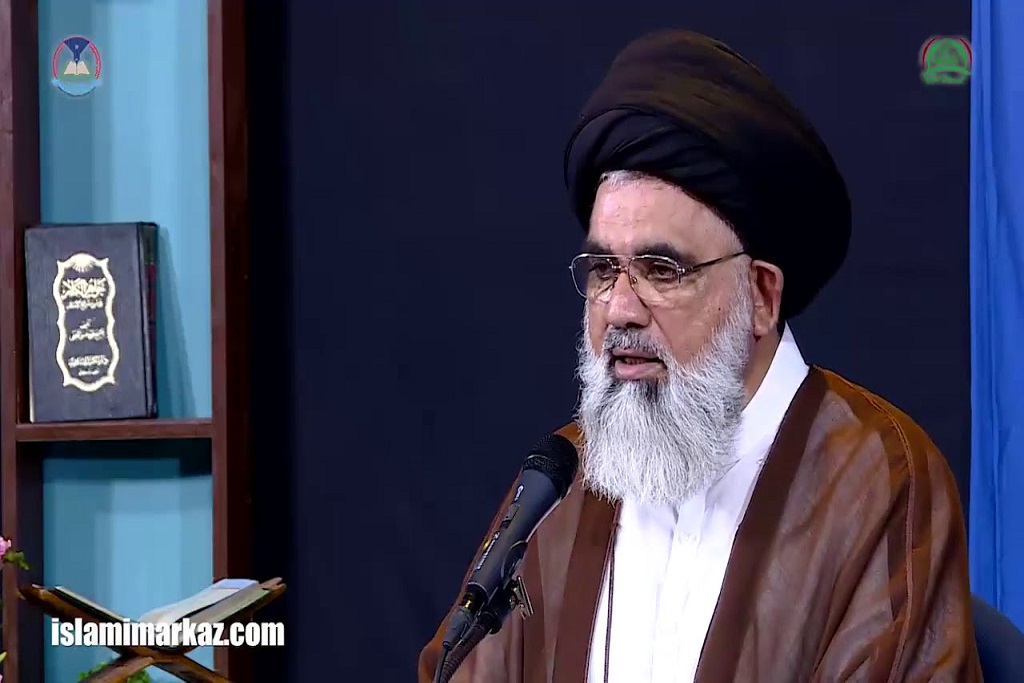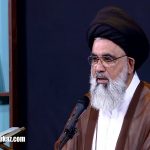Hujjatul Islam Ustad Syed Jawad Naqvi
(Principal Jamia Orwatul Wuthqa – Lahore)
Delivered at: Masjid Baitul ul Ateeq
Lahore – Pakistan
Friday Sermon – 11th August, 2023
Sermon 1 : Justice in personality leads to social justice
يَا أَيُّهَا الَّذِينَ آمَنُوا كُونُوا قَوَّامِينَ لِلَّهِ شُهَدَاءَ بِالْقِسْطِ ۖ وَلَا يَجْرِمَنَّكُمْ شَنَآنُ قَوْمٍ عَلَىٰ أَلَّا تَعْدِلُوا ۚ اعْدِلُوا هُوَ أَقْرَبُ لِلتَّقْوَىٰ ۖ وَاتَّقُوا اللَّهَ ۚ إِنَّ اللَّهَ خَبِيرٌ بِمَا تَعْمَلُونَ {8}
O you who believe! Be upright for Allah, bearers of witness with justice, and let not hatred of a people incite you not to act equitably; act equitably, that is nearer to Taqwa, and be careful of (your duty to) Allah; surely Allah is Aware of what you do
In this verse Allah commands to establish Adl which will then establish Taqwa. We can see that Taqwa is discussed a lot, there are books, lectures but practically we don’t see Taqwa as a practical plan in the lives of believers. One reason is that Adl is ignored in Taqwa and we try to establish Taqwa in our lives , era, land and society without Adl. Hence Taqwa is not seen in the lives of believers.
Allah has made Adl as the fundamental element of Taqwa and for Adl as well we take at surface level only and the way Quran has presented Adl in depth, vastness and meaning that is not considered by us. We only take Adl as a discussion topic in theology (Ilm e Kalam) like today the system presented by Islam has turned into jurisprudential laws and rites. We see experts in lecturing Fiqh and Kalam instead of personalities who hare Adil in nature. The experts by giving lectures on Fiqh, Kalam think that they are doing a great service. An expert like Allama Iqbal says that this has weakened our religion, he says Tauheed has turned into theological debates which was a power of believers.
Adl which we mention in Ilm e Kalam is also not at its right position. There Adl is discussed as an attribute of Allah (s) whereas Quran has mentioned Adl as the foundation of human life. Adl starts with the essence of human life and Adl should start from the personality of human being. When a child is born the first thing that should be preserved in the child should be Adl.
Adl in terminologies means balance. The topic of personality development which Iqbal says Khudi (Self hood) has been forsaken by us. Allah has ordered us to made Khulq ourselves. Khalq is that part of man which Allah has made and given to us like body and various abilities, power that Allah has given. And this Khalq gets completed with Khulq which man has to make by himself. Allama refers to Khulq as Khudi and other sciences like psychology terms it as personality.
Here Adl in personality means the elements which build the personality should be balanced. We have considered Adl in every attribute that makes the personality. When an imbalance occurs in personality it becomes personality disorder. As an example if our diet is not balanced with all nutrition which are present across various types of food, then the system gets disturbed. Like some people only eat meat or children they eat fast food and this presents fundamental deficiencies in human body. In the past if we see people would eat balanced diet with vegetables, pulses, fruits, milk and even meat hence they were healthy and strong. Today the children are living on support of hospital and is placed on drips every month. This is because Adl is not present in human body development.
Similar to body is our soul, self where the personality gets developed and this also needs nurturing like body. The abilities that are kept in soul, self should also be fostered in a balanced manner. Balancing personality does not mean that if he is doing good things, worships he should do less so that balance should be maintained. This is not justice. The injustice means you are nurturing one dimension of self and have ignored others. To develop all the perfect traits in personality is Adl.
After personality , selfhood development the next state is Bekhudi as per Allama. This means from these personalities that are made you need to now make the full building. Making bricks is khudi and then making building from bricks is Bekhudi. To make building with bricks which are exactly same is easy, similarly if the human selfhood (khudi) gets developed by parents and teachers then it becomes easy to construct the building.
If we take things like Quran for guidance of entire life then Quran has expressed very clearly on how you can develop personality inside your child. The poor people do not buy bricks but use stones freely available and try to join them, hence these walls fall down very soon.
The stage of Bekhudi is that the existence of bricks would be lost and only wall and building would be seen with plaster and paint over it. The individuality would get absorbed in society. When you build a society and Ummah with Adil personalities then that Ummah also needs a new Adl. The first Adl was required for personality and now to build society there is a different law and the map of that Adl is also presented by Quran which is mentioned in this verse to establish Kist and Adl.
Adl is the framework within which society would come into system. The Islamic governance does not mean that if a Maulana governs it becomes Islamic. The Islamic government is where justice is present, where the leader, laws, people are all Adil and they establish Adl in society. And Adl also does not mean we equate everyone. The social justice which is the actual field of Adl and individual Adl was also required for this social justice. We can only refer to some points and topics of social justice during these sermons and if Allah grants us Taufeeq we can present social justice from Quran in some other place and then we can compare Islamic government and other systems based on this.
SECOND SERMON
Mashwara should be taken and not be taken from whom
وقال عليه السلام : لاَ مَالَ أَعْوَدُ مِنَ الْعَقْلِ، وَلاَ وَحْدَةَ أَوْحَشُ مِنَ الْعُجْب، وَلاَ عَقْلَ كَالتَّدْبِيرِ، وَلاَ كَرَمَ كَالتَّقْوَى، وَلاَ قَرين كَحُسنِ الخُلْقِ، وَلاَ مِيرَاثَ كَالاْدَبِ، وَلاَ قَائِدَ كَالتَّوْفِيقِ، وَلاَ تِجَارَةَ كَالْعَمَلِ الصَّالِحِ، وَلاَ رِبْحَ كَالثَّوَابِ، وَلاَ وَرَعَ كالْوُقُوفِ عِنْدَ الشُّبْهَةِ، وَلاَ زُهْدَ كَالزُّهْدِ فِي الْحَرَامِ، ولاَ عِلْمَ كَالتَّفَكُّرِ، وَلاَ عِبَادَةَ كَأَدَاءِ الْفَرائِضِ، وَلاَ إِيمَانَ كَالْحَيَاءِ وَالصَّبْرِ، وَلاَ حَسَبَ كَالتَّوَاضُعِ، وَلاَ شَرَفَ كَالْعِلْمِ، وَلاَ مُظَاهَرَةَ أَوْثَقُ مِن مُشَاوَرَةٍ
113. Amir al-mu’minin, peace be upon him, said: No wealth is more profitable than wisdom, no loneliness is more estranging than vanity, no wisdom is as good as tact, no honor is like Taqwa, no companion is like the goodness of moral character, no inheritance is like civility, no guide is like promptitude, no trade is like virtuous acts, no profit is like Divine reward, no self- control is like inaction in time of doubt, no abstention is like that (which is) from prohibitions, no knowledge is like thinking, no worship is like the discharge of obligation, no belief is like modesty and endurance, no attainment is like humility, no honor is like knowledge, no power is like forbearance, and no support is more reliable than consultation.
وَلاَ مُظَاهَرَةَ أَوْثَقُ مِن مُشَاوَرَةٍ
no support is more reliable than consultation.
There is no support greater than Mushawarat, to provide and to take. Some people think that this great center Orwatul Wuthqa which has come into existence has been through money and big containers of money come here. People come to us for funding their projects as they think we have a lot of funds. I always tell that we cannot financially support you because we are ourselves weak but the thing which Allah has given us we can tell you those principles. This Jamea was not made by any outside funding but by the efforts of few believers and if others also learn this then they can do their work as well. The fact is that when you see something done successfully then take consultation (Mashwara) from them, because this is much worthier to take from them then getting money from someone.
As I mentioned Mashwara does not mean democracy whereby to take decision based on opinions of majority is not at all meaning of Mashwara. It means in any work there are certain things which are clear and some are hidden which are only known to expert experienced persons only. When we start something new then many dimensions of the work are hidden which are known to those who have done this. This Mashwara is very effective and Prophet (s) was told that even though we give you the decision but still you consult people so that people can follow the same. You have to take decision as per Wahy but the Mashwara has its only wisdom as it exposes the hidden dimensions. The biggest guidance is this consultation.
In his saying no 54 also Ali (a) has given this guidance which we have discussed this before as well. He says the same that biggest supporter is one who gives Mushawara.
In this chapter of Mashwara we have to come out of this misguidance that Mashwara means to take opinion and decision. And then the guidance which Ahlulbayt (a) have given us we should also follow. There are many traditions on this, but I am presenting a comprehensive one from Mizan ul Hikmah
The tradition talks about from whom you should take consultation. We should know that consulting should not be done with everyone, like from fools or even from Women the Prophet (s) says to not take any consultation. This means the women do not have that much deep thinking and if you have to take Mashwara from women then you should know that she is a real expert. If you start to consult every women then they will give you weak counselling. Since the women are passionate they do not consider all the dimensions. Then he says Mashwara should not be taken from weak, greedy, liars, fatigued persons. The Ahlulbayt (a) have expressed complete guidance for Mashwara but still these Ulama are so powerful that they inferred democracy from Mashwara.
Imam Sadiq (a) says to whom you should give consultation. Do not become the first consultant and not start to speak immediately. Let others speak and specifically when some more experienced person is present. Fateer is the bread from fresh flour dough and there are bread made from dough which is kept for some time. Imam (a) says do not give that suggestion, consultation which is not well cooked or given time. The think that comes in mind man should keep that in mind for sometime so that it becomes firm. The wisdom should also be kept for sometime and not immediately deliver it. Do not give consultation by Irtejal that is patting the feet and jumping on it. Do not take consultation from an arrogant person who will try to enforce his opinion on you and also not give consultation to one who will not listen but stick to his own opinion. Do not give or take consultation to Wagad person , that is one who is lowly, abased and does not possess any values. Even if they have experience then also do not take any advice. Do not give or take consultation to one who changes color every day. Do not give or take consultation to stubborn (Lajooj) person as he will not listen or accept you.
If someone comes to take consultation from you, then preserve fear of Allah from the point that you do not counsel someone based on his desire. Like someone comes to you for consultation and wants to do something which he has decided, and we know that he is thinking wrong, but still we say you are good person, excellent thinking. This means giving consultation as per the desires of the addressee should not be done. To conceal the faults, realities and just to please them on their opinion. Like some people take advice that we want to get married our child in this home. You know he wants to do and if you refute he will not listen, then also give the right counselling. One who gives consultation as per desire of people is lowly and abased. The one who has come to take consultation then you tell him wrong, evil things which he likes is not to be done. Like someone comes and consults to do evil thing, then do not let it go, but instead tell him about the evils which you are doing. You can consult an enemy but not with fool, miserly person. Imam Ali (a) says you can definitely consult with an intellect enemy and refrain from an insane, ignorant friend. The one who makes you cry by consultation but one who makes you laugh do not consult.
For democratic consultation, the third caliph made a Shura and made Ali (a) as part of that Shura. Ali (a) had extreme pain that I was made a member of this Shura, he did not had pain that he was not selected as he said I do not desire to govern over you. Ali (a) said to make me sit with such persons is too bitter and hard, to select someone.
When Ali (a) was selected as Caliph, Talha and Zubair did allegiance and were doing campaign for making people do allegiance for Ali (a). These two persons came to Ali (a) and complained that you do not take consultation from us in government affairs whereas we made you Caliph. Ali (a) said I do not have any attraction towards governance but only because of completion of argument I came into this position. Ali (a) says when I was given responsibility which I took then first I turned towards Quran, then towards the customs of Prophet (s) and followed it. So neither do I need your opinion and nor of others, I know how to run the government and I am not ignorant of any government affairs. If there is a need that comes as well then also I will not consult you nor your friends. When you say such blunt things , straight forward then what will happen? What distanced Zubair ibn Awam from Ali (a) was one his own son and second this tone of Ali (a) which he could not tolerate , though he was a close friend of Ali. Who will tolerate this statement that I will not take advice from you at all. We can assess ourselves; can we tolerate? Why do we object those companions. Even when soft things are spoken to us we don’t tolerate.







Justice in personality leads to social justice/ Mashwara should be taken and not be taken from whom: Ustad Syed Jawad Naqvi – Faraan English